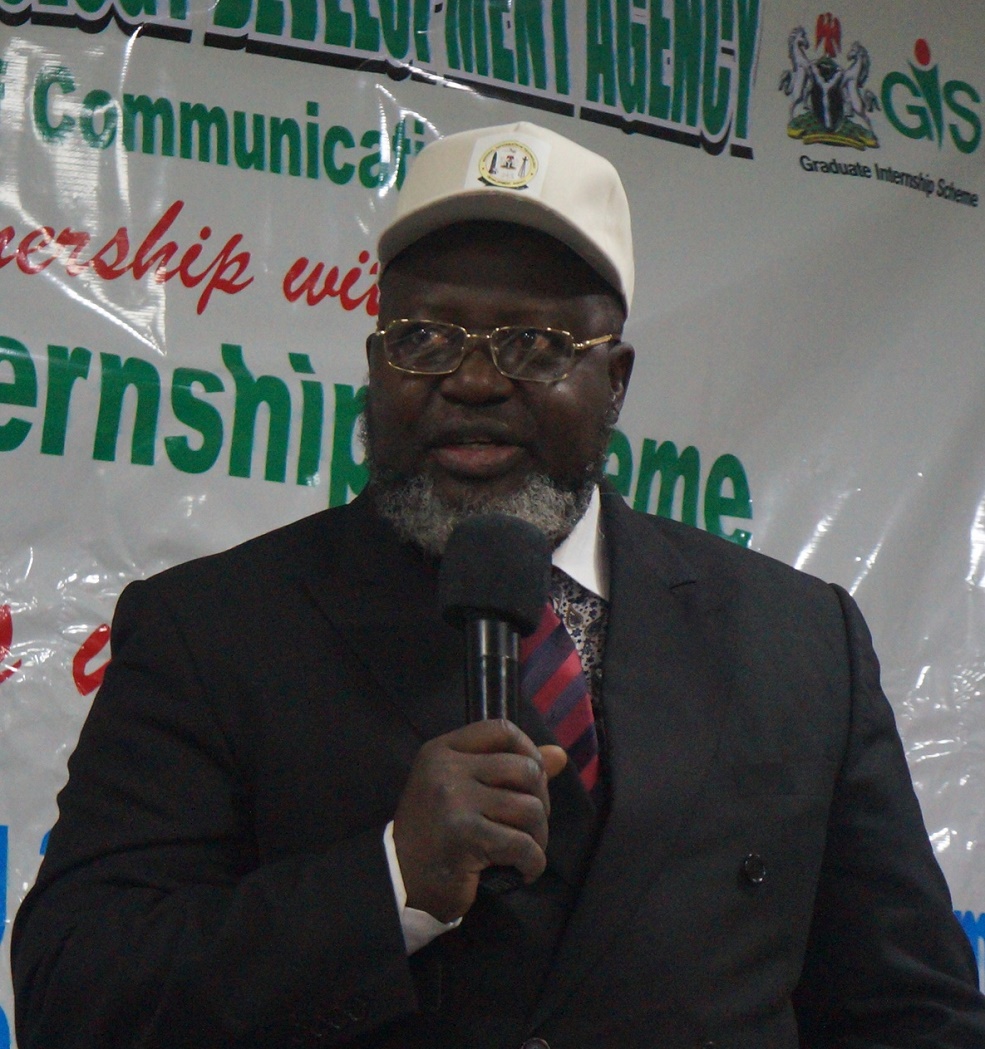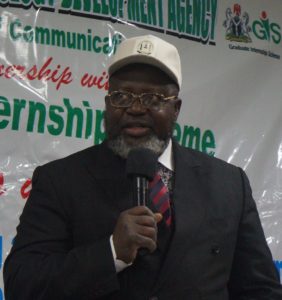Nigeria’s Minister of Communications, Adebayo Shittu, lawyer and politician, speaks with the media in Lagos on why the ministry is intervening to enhance ICT capacity among fresh graduates, his roadmap, why government MDAs (ministries, departments and agencies) must be decreed to patronise NIGCOMSAT satellites and why states must be engaged to quit imposing a multiple tax regime on telcos. IT EDGE NEWS, Anthony Nwosu,captures this at the 2016 National Information Technology Development Agency (NITDA)/Graduate Internship Scheme (GIS) youth empowerment and job creation training programme.
There appears to be a big disconnect between the Ministry of Education and your own ministry – What will you say about a student of Computer Science not being able to write a simple program; are you looking at sending a curriculum to the universities?
The people in the Ministry of Education are administrators and they are not necessarily experts. The experts are those in faculties and departments in the various universities. If we have lecturers who have been teaching same thing for the past 15 years and have forgotten that ICT is all about innovation then you can understand the situation we have found ourselves today. You don’t have to put the blame on the Ministry of Education but on the lecturers who have refused to upgrade their skills. This should be put to the various faculties and universities in Nigeria. It is very sad that graduates of Computer Sciences will come out of school and say that they do not know what Word Processing is. It is very sad. We have all seen it today. We must all be weeping for the education system. The lecturers must develop their skills and must not feel complacent about this. I am happy that government is taking this initiative serious; we never knew how terrible it was.We don’t have control over university teaching in ICT education but we have to try our best to have collaborations. We are also making graduates of other engineering and even social sciences to get interested in ICT. We are using GIS to ensure that students not only do the theories but also do the practical part of the ICT. That is why we have collaborated with the Ministry of Education. We want to use this medium to correct this deficiency in IT training. I must add we want to have a professionally sound ICT institution where people will not only read but learn with their hands in an environment which is conducive like what is applicable in India and China.
These interns know nothing about IT and some are graduates of Computer Engineering. Don’t you think that there is something fundamentally wrong with our educational sector?
I have said it. The fault is from the faculties in universities. The Nigerian universities are becoming obsolete and lecturers are not upgrading their ICT skills. This is an intervention from the Ministry of Communication. We will continue to sustain this and also improve on it. I am not the person to know if the curriculum is faulty. The teachers should be able to update their skills.
Quote: “We want to use this medium [GIS] to correct this deficiency in IT training…. We want to have a professionally sound ICT institution where people will not only read but learn with their hands in an environment which is conducive like what is applicable in India and China.”
Are you showing the footprints you have recorded today to the federal executive council?
Yes, we will do so. We want to ensure that ICT is well taught in our institutions.
Is the digital university part of your roadmap?
Yes, it is part of our roadmap. Over the past years, the ministry has several institution across the geographical regions. They are in six locations. They are meant to create manpower for ICT. But when you look at these institutions you will understand that these digital institutes are grossly under-utilized. I believe that in the dynamic nature of ICT space, all that is required is to have the political will to develop a professional academic environment that will further the trainings. Nigeria with the population of 180 Million means that we have a huge market for ICT products. ICT is the driving force in our lives and other professions and even bringing in non oil revenue, we should have a specialised training university for ICT.ICT today engages more workers and this is why we need to have a specialised university. And as we have six Digital Bridge institutes in these six geopolitical zones, each of the zones will be a campus for a specialised part of ICT.
Local patronage is a problem, what efforts have you put in place to ensure that local ICT products are accepted?
We have local a content policy that will encourage local participation and consumption of ICT products. Take for instance, we are encouraging NIGCOMSAT to be optimally utilised, we have put measures to ensure that NIGOMSAT is patronised. The satellite has potential but it is not optimallyused. We will put legislation in place that will ensure that all government parastatals and bureaux use Nigerian ICT products. NIGOMSAT currently boast of a satellite in orbit but as of now it is not optimally utilised by Nigerians and we are working towards putting two more satellites in space. Once this is done, nobody will have an excuse not to use Nigerian satellites. We will ensure that government office subscribes to the satellite and this is one of the majors we have put in place.
This administration is going to mark a year and you as a minister, you will mark your sixth month; can we know your landmark successes so far?
Well, I will say that we have political stability in Nigeria today. Trust has been restored to governance. In the past, people do not trust government because all what the people see in governance is criminality. There was stealing of funds and destabilisation, look at the arms and ammunition money and how it was stolen. Today, in Nigeria when government budgeted for a specific item, it uses it. Government has introduced measures that will block all loopholes that people use to steal money. With full compliance to the Treasury Single Account (TSA); government has been able to save two trillion naira. Within the next few months, Nigerians will begin to see changes. Petroleum subsidy is another thing, past governments have never had the courage to remove subsidy but with this government subsidy has been removed and allowing market forces to determine the petroleum prices. Mind you,even the money that was meant for the so-called subsidy was going to a cabal or certain people. The government is intending to build refineries. Government is resolute to allow market forces determine prices and to build refineries.
What has been earmarked for the development of telecom infrastructures?
Everything good has been earmarked! We have a roadmap. As of the figures, I do not have the details of the figures. Our ministry has the political will and ideas to drive the ICT industry. We will ensure that the money meant for each project is used judiciously. We have the political will and the dynamism to drive the budget.
Quote “We can’t allow double taxation to kill the industry. We asked foreigners to come and invest in Nigeria, they came with their expertise and we will not allow people to kill them in the name of taxation.”
Over five billion naira has been earmarked for intervention funds and one of the key sectors is technology, what is your ministry doing about this?
I don’t have the details now, this is an inter-governmental thing and it’s not for open discussion.
What are you doing to ensure that the state governments reduce the issue of double taxation?
We are looking at that. We are going to have interaction with the Governors Forum. We need to talk to them, interact with them and appeal to them. We need to let them know that ICT is a critical infrastructure and so it must not be seen as one of the ways to make money or be deemed a cash cow. If ICT isn’t in place, governance might grind to a halt. Before we had this development in telecommunication sector, we had less than 500,000 lines then but now we have this boom, we can’t allow double taxation to kill the industry. We asked foreigners to come and invest in Nigeria, they came with their expertise and we will not allow people to kill them in the name of taxation. For instance, a mast installation costs about 30 million naira, if Nigeriahad enough electricity to power these base stations and not telecom firms buyingdiesel to power these base stations, things will be cheaper. We are creating incentives, we appeal to state governors to do a rethink. There are many places that the governors can generate money. ICT should not be the sacrificial lamb. If the state governors continue with this approach, we might go back to the days of NITEL and difficulties.






























